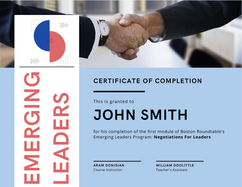Negotiation Skills For Any Context

Leaders negotiate every day. Whether in simple day-to-day operations or when managing a crisis, leaders work to solve problems by, with, and through others both within and outside of their organizations, business, and governments. They negotiate over timelines, deadlines, milestones, resources, costs, terms, personnel, roles, metrics, rewards, recognition, and the nature of relationships and partnerships. Yet, while leaders negotiate daily, many fail to realize that they are in a negotiation, most know very little about why they are sometimes successful and other times not, and even fewer know what it takes to be consistently effective.
This first module in our Emerging Leaders program will highlight the components of an effective negotiation and teach young leaders, to analyze their own behavior in negotiations. As much as the hope of this course is to help participants become more effective in their personal lives, the primary objective is to ensure that participants feel increasingly confident in using negotiation in the professional context – to influence others, solve problems, resolve conflicts, align key parties, and generally get things done in their community and the world.
This first module in our Emerging Leaders program will highlight the components of an effective negotiation and teach young leaders, to analyze their own behavior in negotiations. As much as the hope of this course is to help participants become more effective in their personal lives, the primary objective is to ensure that participants feel increasingly confident in using negotiation in the professional context – to influence others, solve problems, resolve conflicts, align key parties, and generally get things done in their community and the world.
Faculty Lecturer - Aram Donigian
|
Negotiations for Leaders is instructed by Lieutenant Colonel (retired) Aram Donigian, a visiting professor teaching Negotiation at the Tuck School of Business at Dartmouth, as well as a Senior Trainer with Vantage Partners in Boston, specializing in negotiation, leadership, relationship management, critical thinking, and emotional intelligence.
He received his undergraduate degree from the United States Military Academy at West Point and his MBA from Tuck. Aram served in the U.S. Army for 21-years as an Infantry and Public Affairs officer, deploying three times to Afghanistan where he worked with military leaders to resolve challenging and complex situations related to governance, contracting, and corruption. He co-founded the West Point Negotiation Project in 2009 and was an Assistant Professor in West Point’s management program, where he earned the Apgar Award for teaching innovation. Aram co- authored several articles on negotiation centered within the military context, including Extreme Negotiations published in the Harvard Business Review, which is used in our course. Aram also created and launched an integrated, cross-disciplinary leadership development curriculum at the Air Force Academy where he also taught for 4-years. He continues his work with the military today delivering training on strategic influence and negotiations for Navy SEAL Platoon Leaders and others. |
2020 Class Schedule
|
The 2020 iteration of our negotiation course meets bi-weekly for one month (5 weeks total).
Classes meet Tuesdays and Fridays from 9-10 AM US Eastern Standard Time via Zoom link. Please double check local time zone differences to ensure you are attending at the correct time or refer below:
|
|
Readings and Grading
This course is built around a series of negotiation exercises and reviews one might encounter in an MBA program, but are applicable in a variety of fields. Due to the rigor of the assignments, students will be expected to be fully prepared for exercises prior to class and to participate in the reviews. Students will also be evaluated via:
In addition to the provided readings, course materials are related to the following recommended works:
- Journal Entries (30 of Grade%): Students will keep journals which build on experiences from within the class as well as their personal life.
- Peer Review (5% of Grade): Students will be asked to comment on the journal entries of other students
- In-Class Participation (20% of Grade): Students will be expected to engage in all material presented in class
- Final Essay (40% of Grade, as well as 5% Proposal): Students will be asked to write summarize, analyzes, and offers suggestions on a current issue between the United States and China.
In addition to the provided readings, course materials are related to the following recommended works:

William Fisher and Roger Ury's Getting to Yes is considered a staple book in negotiation processes since its publication in 1991, and has seen numerous republications and expansions. Through case readings and applied knowledge, Professor Donigian centers his teaching heavily on the Fisher school of thought.
William Fisher and Roger Ury's Getting to Yes is considered a staple book in negotiation processes since its publication in 1991, and has seen numerous republications and expansions. Through case readings and applied knowledge, Professor Donigian centers his teaching heavily on the Fisher school of thought.

Written by negotiation expert Jeff Weiss, the HBR (Harvard Business Review) Guide to Negotiating provides a disciplined approach to finding a solutions using a seven-part framework. Weiss guides the reader on how to prepare for the conversation, understand everyone’s interests, craft the right message, work with multiple parties, disarm aggressive negotiators, and choose the best solution

Douglas Stone , Bruce Patton, Sheila Heen's co-authored Difficult Conversations coaches on how to broach difficult subject matters even beyond the context of negotiation. Culminated from 15 years of work at the Harvard Negotiation Project and consultations with thousands of people, the book offers compelling strategies in uncomfortable situations.
Advantages

Among the key teaching objectives, Emerging Leaders aims to:
- Utilize negotiation as an instrument to effectively develop and manage a long-term, healthy relationship between China and the United States of America
- Develop an appreciation for and understanding of another culture and perspective
- Spot and question the assumptions you bring into negotiations
- Prepare systematically for negotiations
Application
Negotiations For Leaders's content pulls from material normally seen in an MBA course, and is therefore recommended for motivated and self-driven high school students. All interested students will submit a brief application detailing their basic information as well as why they are interested in the course. Successful applicants will be notified within 3 days of their application. The cost of this program is $649. Payment will be required after notification of acceptance.

